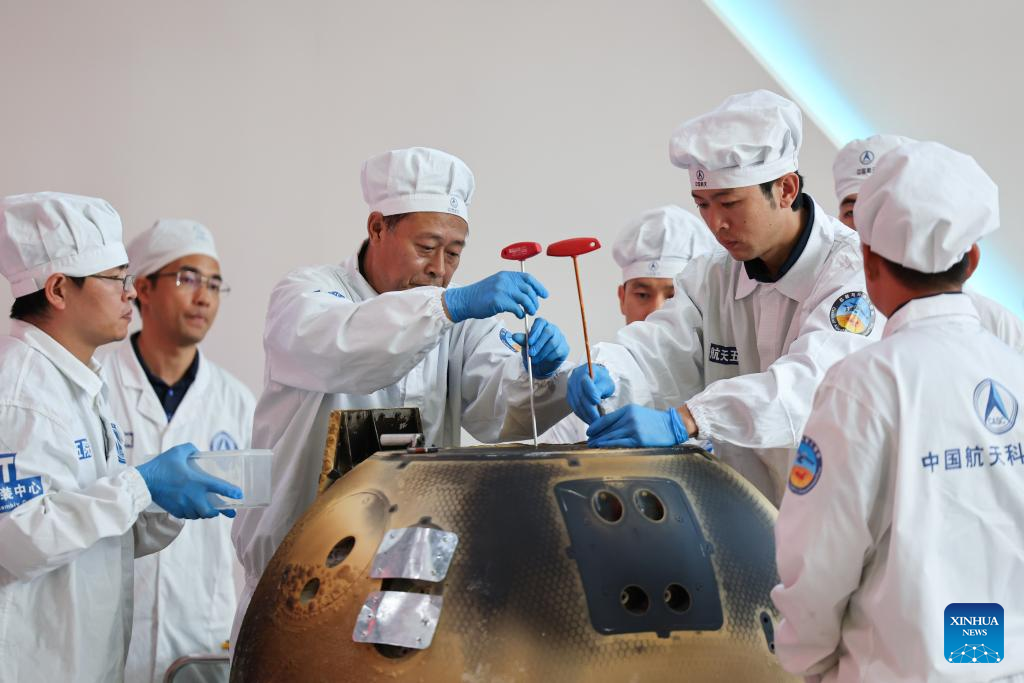2.07.2024

China's remarkable achievement of retrieving the first-ever samples from the far side of the moon has sparked discussions about the United States' strategy of excluding China from space projects. Experts are urging the US to consider inclusion over exclusion.
The Chang'e 6 probe returned to Earth on Tuesday with rock and soil samples from the lunar far side, a region that constantly faces away from our planet.
The probe landed on the moon on June 2 and lifted off two days later to begin its journey back to Earth. The far side of the moon presents unique technical challenges for both landing and liftoff. Despite these difficulties, China successfully landed the probe, collected samples, and returned them safely.
These samples are expected to provide insights into the origins of the solar system. Additionally, the potential for utilizing lunar resources offers a promising opportunity for collaboration between the US and China, especially in advancing artificial intelligence technologies, according to an editorial by Sinotalks, a Silicon Valley-based think tank and consultancy.
"Prior to the Chang'e 6 mission, China published the world's first high-definition lunar geologic atlas to, among other goals, facilitate scientists' identification of a proper site for a potential lunar station. New knowledge acquired from analyses of samples brought back by the Chang'e 6 probe will enrich the content of the atlas, making the establishment of a lunar station more promising," said Mei Gechlik, founder and CEO of Sinotalks, in an interview with China Daily.
With the establishment of a lunar station, more effective studies on the moon's resources and evolution, as well as the entire solar system, could be conducted. This could lead to the discovery of new lunar resources for developing AI hardware more powerful than existing semiconductors, Gechlik added.
Moreover, innovative AI applications could be tested at the lunar station under conditions not available on Earth. Gechlik stated, "These long-term and expansive benefits should motivate China and the United States to collaborate by contributing the financial capital and human capital needed to pull off this feat."
Taylah Bland, a researcher at the Asia Society Policy Institute's Center for China Analysis, also sees potential for China-US cooperation.
"China's latest achievement as the first country to land on the far side of the moon reinforces its space exploration strengths and capabilities," Bland wrote in a newsletter. "Despite an ongoing space race with the United States, China's collaboration with the European Space Agency on the Chang'e 6 mission highlights the potential for cooperation, not competition," she said.
However, ongoing tensions between the two nations pose a significant hurdle to such collaboration. The US has excluded China from NASA projects since 2011 and has increased restrictions to limit China's access to US-developed technologies, aiming to contain its AI development.
Sinotalks suggests that the US's exclusionary approach, intended to weaken China's space technology advancement, might be counterproductive as it also bars US participation in China's space missions.
"Unlike their counterparts from France, Italy and Sweden engaging in moon-related research supported by payloads carried by the Chang'e 6 probe, US scientists have missed these opportunities because US restrictions have also excluded them from participating in China's space projects," Sinotalks noted.
The think tank's editorial board questioned whether these restrictions would genuinely hinder China's AI development, considering its ability to overcome obstacles and continue with its space exploration.
While it is unlikely that US restrictions will be lifted soon, China's historic lunar mission presents an opportunity for a shift in stance, according to Gechlik.
The 4 billion-year-old lunar samples brought back by the Chang'e 6 probe are 1 billion years older than those brought back by the US and the former Soviet Union decades ago. Gechlik suggested that China has "a good opportunity to extend an olive branch" to the US by inviting its scientists to study the new samples together.
The determination of US scientists to remain competitive in lunar exploration may prompt them to urge US authorities to accept China's olive branch, she said. "If this occurs, a new era of 'moon diplomacy' will begin."
Quelle: SD
